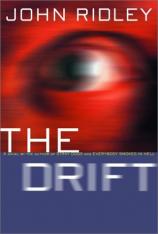The Drift
Review
The Drift
America didn't always have a problem with obesity. I've read a few
treatises that hold that this country's love affair with elastic
waistlines began in the late 1800s, about the time that a cheap
method of refining sugar was discovered and bakers started sticking
it into everything, from the obvious (breads, cakes, pies) to the
not-so-obvious (cole slaw, barbecue sauce). Yep, most of us have
one gigantic sweet tooth, and it extends beyond our food appetite.
We like our truth with a little bit of sugar, too --- to make it go
down easier. That's why a book like THE DRIFT is going to be a
little hard for some of its audience to take. This isn't
cherry-flavored NyQuil cough syrup; no, it's more like
mopwater-flavored Buckley's. And Buckley's, as our neighbors to the
North know, works.
John Ridley's writing is as gritty as the last 10 miles of a 50
mile one lane rut. If you're expecting a nice little politically
correct diatribe from the nice-looking black man, forget it. This
guy is gonna rock your world and turn it upside down with
unvarnished truth. The violence is ugly, the sexuality is
primitive, and the anger and despair is pervasive. It's not that
you won't be able to stop reading THE DRIFT --- you're going to
have to look away in spots. No, you're going to have to grip it
with both hands to keep it from rearing up and smacking you a few
times where it will do the most good. You'll lose, by the
way.
THE DRIFT isn't so much about a black tax attorney named Charles
Harmon as it is about Brain Nigger Charlie, the guy Harmon becomes.
Harmon is leading a nice existence earned through his labors as a
tax attorney when he begins experimenting with street drugs. His
life takes a downward turn, and in less time than it takes to tell
about it, he is out of a job, minus a wife and out on the streets.
Don't say it doesn't happen. By the time the smoke clears and the
dust settles he is Brain Nigger Charlie, riding the boxcars from
Point A to Point B, running from his memories and running from
himself, learning the desperate and ugly rules of survival while
feeding his drug addiction any way he can.
Charlie's rotten apple cart of a life is upset when he is asked to
find the teenage niece of the man who becomes his railroad mentor.
Charlie doesn't believe that the runaway girl is still alive but,
feeling the obligation, begins searching for her along the tracks
leading from Iowa to Seattle, Washington. Charlie soon finds that
others are looking for her as well, and soon finds himself caught
between the law and a well-organized group of drug dealers who have
found the destitute denizens of the railroad yards to be the
perfect mules for running drugs throughout the country.
Charlie doesn't find that he can't trust anybody --- he already
knew that. No one can trust Charlie, either. His rough code, honed
to a sharp edge by self-preservation, leaves room for love of no
one but himself. And he hates himself.
But he hates other people more.
Any romantic notions you might have held about hobos, trains, and
drifters will be permanently, irrevocably eradicated after you read
THE DRIFT. It works out okay, though. Charlie brings the girl back
home, she finishes school and becomes a doctor, and Charlie sobers
up, reunites with his wife, and goes back to his law firm where he
is greeted with open arms and an offer to double his salary. But
that isn't what happens. No, not hardly. You won't be able to read
THE DRIFT without waking up in the middle of the night and
wondering if it could all happen to you. And you'll know, deep in
your heart of hearts, that it could.
Reviewed by Joe Hartlaub on January 21, 2011



